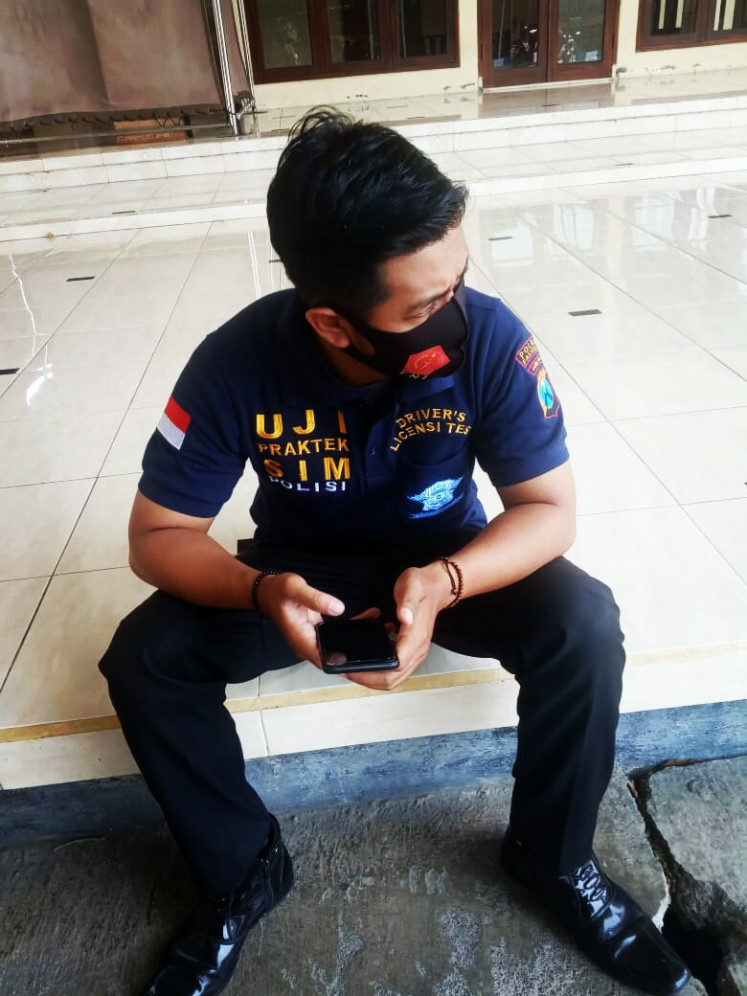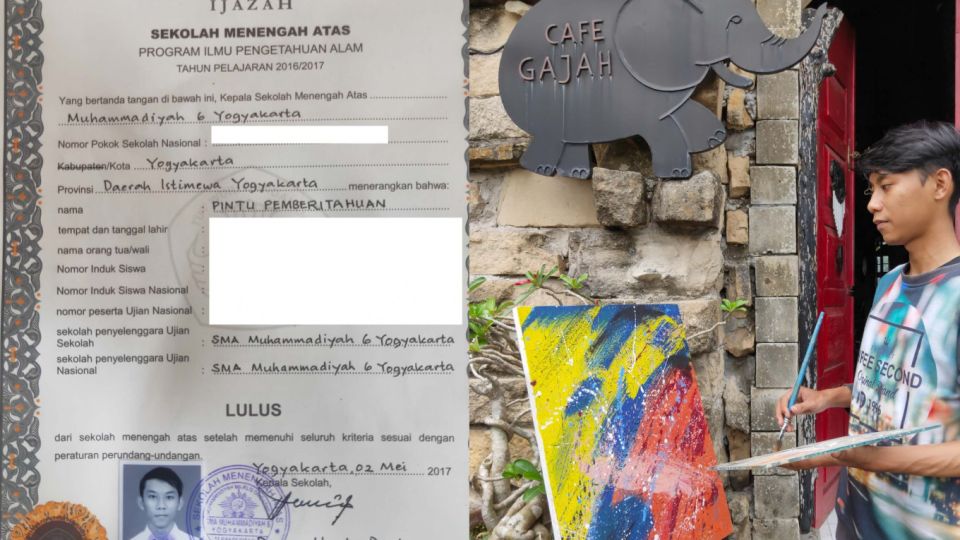February 28, 2022
JAKARTA – Indonesians with unique names share how it has affected their life and luck.
Many Indonesians have names so unique that they become internet famous — if only for a day or two. For some, the uniquely named are a passing gag to share and laugh lightly about with friends.
In recent years, Indonesian social media has abounded with the IDs of individuals with names ranging from Mati (dead), Tuhan (God), Aneh (weird), Satria Baja Hitam (the Japanese superhero Kamen Rider Black), Kanjut (underwear), Jashujan (raincoat), Pajero Sport (a car brand), Y (the letter), F (also the letter), Saiton (Satan), Andy Go To School, Dontworry, Royal Jelly (a snack), Es Bon Bon (an ice snack), Slamet Hari Natal (Merry Christmas), Anti Dandruff, Pangeran Ganteng (handsome prince) — you get the picture.
It may seem like a joke, but for the person actually living with that name, it is a reality they must live with every day, for better or worse.
Origins
Polisi is a security guard at Pasuruan Police station, East Java. His name, if it is not yet obvious, means “police” in Indonesian. In 2017, Polisi experienced mild internet fame when stories of police officers booking him for driving without a license went viral. The story had a happy ending of sorts. The force offered Polisi a security job because of his unique name.
“From what I’ve heard from my parents, I was very weak when I was a baby and I got sick easily. People suggested they change my name,” Polisi shared.

Accidental fate: A man named Polisi work at Pasuruan Police station in East Java. (Personal Collection/Courtesy of Polisi) (Personal Collection/Courtesy of Polisi)
He shared that his parents changed his name at least five times (this is common among many Indonesians during their child’s early days — though maybe not five times). His previous names had religious overtones, such as Ikhsan and Musoffak, but they did not prevent him from getting sick, so his parents continued to change his name. Polisi doesn’t know what went through his parents’ minds when they eventually chose the fifth name. What he knows for sure is that he never dreamed of becoming a security guard.
Did Polisi’s name dictate his eventual career path?
“Well, I don’t know. I never believe in such things. I have never had a dream to work as security, but maybe I’m just lucky,” Polisi said.
Pintu Pemberitahuan (roughly the door of announcement) is a 23-year-old living in Yogyakarta, who works as a part-time graphic designer and food and beverages staff in a hotel.
“My parents told me that my father named me after one of his paintings. They believed the name had such luck. Back in 1998, when my dad held an exhibition, he did not have high expectations because of the monetary crisis, but his painting with the title Pintu Pemberitahuan was sold,” Pintu shared.
Culture and association
Yunike Balsa Rhapsodia, a psychologist based in Jakarta suggests that for some, their name subconsciously affected their choices in life.
“We are actually comfortable to be associated with something that we are familiar with, including our name. So sometimes it can affect our decision-making or even the career path that we choose. We call that ‘implicit egotism’. However, if we keep our implicit egotism going, it can become nominative determinism,” Yunike said, referring to a theory whereby people tend to gravitate towards areas of work that fit their names.
For example, research published in the United States in 2002 showed that people named Dennis or Denise were more likely to become dentists than people of other equally popular names.
Roro Ningrum, a counselor based in Malang, added that there was a cultural factor determining why parents usually choose unique names for their children. In some beliefs, like in Javanese culture, people are hopeful that a positive name might give people a better life outcome.
“As a Javanese [person] myself, I felt like sometimes they have the tendency to give their children a name that is inspired by prayers. They are hoping that their children will have a bright future. And often, those names would [affirm that belief],” she said.
Contemporary coincidence
The current COVID-19 pandemic would not have crossed the mind of Corona Rintawan’s parents. Leading a COVID-19 task force at Muhammadiyah Hospital Lamongan, East Java, Dr. Corona has been making national headlines not because of his contribution but because of his name. He jokingly shared that his parents were not time travelers, and revealed that his name actually was inspired by a car from the 1970s. “I also know that corona means crown in Latin,” he added.
Corona dreamt of being a doctor when he was young.

Happy coincidence: Dr. Corona’s parents were not ‘time travelers’ using the COVID-19 pandemic as inspiration for their son’s name. (Personal Collection/Courtesy of Corona Rintawan) (Personal Collection/Courtesy of Corona Rintawan)
“I have been intrigued with health topics ever since I was in primary school. Several times I won the ‘young doctor’ competition at school,” he added.
“I believe that names have implications for our lives since they are a prayer gifted to us by our parents. So it’s actually dependent on ourselves. There are times that people have such a meaningful name, but they don’t behave accordingly,” he continued.
But normative determinism is not just for people with obviously unique names. Balsa added that it could happen to anyone because everyone has their own uniqueness.
“People might not have a name that’s too obviously related to their job. For example, if I use my own name, Yunike was derived from the word ‘unique’ and ‘June’, because my parents always use a monthly element as a part of their children’s name. As a psychologist, I also wonder if a name can provide some insight into a person’s personality,” she continued.
Of course, names do not always guarantee that a person can secure a certain occupation. Arielle Mamahit, a psychology graduate from Miriam College Manila, said that there were other factors determining someone’s future, such as the family and environment where one is brought up.
Of course, names do not always guarantee that a person can secure a certain occupation. Arielle Mamahit, a psychology graduate from Miriam College Manila, said that there were other factors determining someone’s future, such as the family and environment where one is brought up.
“Personally, I think normative determinism was more relevant in the past. Nowadays, the outcome of our life is determined by our efforts,” she added.
Behavioral effect
Furthermore, a unique name can affect someone’s behavior. Balsa explained that unique names could become a source of bullying by peers.
“We cannot blame [those who are sensitive about their name], because there are people who don’t feel comfortable when they are asked about the authenticity of their name. Some would use it as a joke. For example, people tease me by calling me ‘Balsam’. So, there are factors that are affecting someone’s behavior, and the name is one of them,” Balsa added.
According to research conducted by US psychologist Jean Twenge, people who do not like their name tend to have poorer psychological adjustment because they have less self-esteem.
Pintu shared that indeed there were times when people put him in an uncomfortable situation, including when his ID card was shared on an online platform.
“There was a time when people asked me if I was going to name my child ‘Jendela’ (window) in the future. But I think the positive side to having a unique name is that people remember me easily because of my unique name,” Pintu shared.


